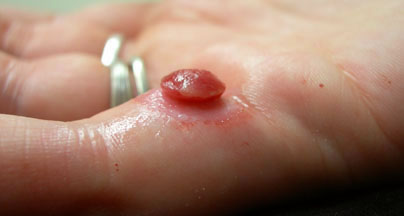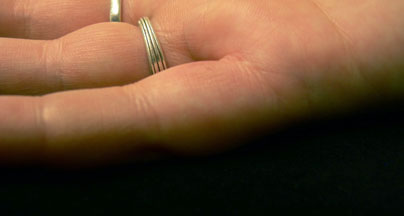Hypertrophic Granulation
Hypertrophic granulation tissue is typically a bright red lesion that looks a bit scary. Relax: it is OK. All it is is some healing scar ("granulation tissue" in medical terms) that is growing too much ("hypertrophic") due to some superficial infection in the healing scar.
It is easily treated, as this case shows. This patient is a 24 year old woman who got a splinter in her little finger. She fiddled with it with a needle and finally got it out, but this growth appeared a few weeks later:
 |
| Hypertrophic granuloma in a little finger, seen from the side. |
 |
| Here is her finger about a month later. |
This is a fairly typical case, which can out with a simple break in the skin that someone fiddles with, or a complex break in the skin such as a fingertip crush injury. While the scar tissue is trying to heal the wound, it gets infected, sometimes by itself, sometimes with a bit of help from the patient (as in this case). They can usually be treated by either touching the surface with silver nitrate, which turns the tissue black and helps the body heal the lesion, or for larger, suspicious, or unusual lesions, removing the lesion and treating the base with silver nitrate. It is important for the latter group of lesions that this be done by a surgeon and to send the tissue for examination, in case it is not hypertrophic granulation tissue, but something else. It is rare, but possible, it could be something else, such as a squamous cell skin cancer. These rarely need more than one surgical resection (cutting it out) and commonly need more than one treatment with silver nitrate. However, once cured, they do not come back.
If you have a lesion that looks a bit like this, be sure to have it evaluated by a physician. Do not try to treat it yourself, as it will often get worse.
